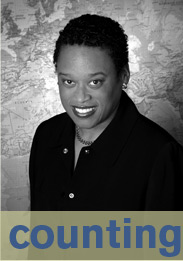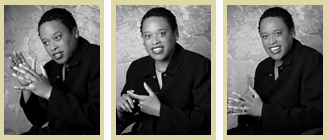 
Melissa Nobles, Associate Professor of Political Science, studies racial and ethnic politics, nationalism, social movements, and issues of retrospective justice. Her book, Shades of Citizenship: Race and the Census in Modern Politics (Stanford University Press, 2000), examines the national census in Brazil and the United States—and explores the politics that lie behind the counting. Nobles—president of the National Conference of Black Political Scientists, and an advisor to the U.S. Congressional Black Caucus Foundation—is currently studying the phenomenon of official apologies.
Okay. Born in East Harlem, and raised in the Bronx and New Rochelle, where I attended high school. I went to Brown University in 1981, and majored in history, focusing on the history of the Americas—the U.S., Latin America, and the Caribbean. After college, I worked for two years in New York City for Teamsters Local 237, which represented city employees. I ran a program for union members' kids, trying to help them get jobs. And I found out that it was Mission Impossible, mainly because of the failure of New York's public schools. I was always working on a shoestring budget, and under a lot of pressure from union members who wanted to know why I couldn't get jobs for their kids. It was really kind of stressful and frustrating. So I decided, "I've had enough of the real world." [Laughs] "I think I'll go to grad school." As an undergraduate, I studied Portuguese, and took several courses on slavery in Latin America. Brazil was a major slaveholding country in the hemisphere, like the U.S., and it had always posed an interesting question: why did it look so different from the U.S.? Why no segregation, and why no big civil rights movement in Brazil? When I went to graduate school at Yale, I renewed that interest in Brazil.
In the summer after my second year at Yale, when I worked for the Ford Foundation in Rio. While I was there, we received a proposal from an organization that wanted to mount a campaign to get Brazilians to choose a darker color on their census schedules, to prove that there's discrimination in Brazil and vast inequalities according to color. It set up an interesting tension—"What is this? Is it political, or is it social science?" So I ended up going to a lot of the meetings of this organization as they were planning this campaign, and I started thinking that this might be what my dissertation would be about.
I guess "shock." Here, unlike Brown and Yale, the humanities and social sciences were only a small part of the larger picture. Having said that, I've found my place here.
Well, in my dissertation, the U.S. was always a frame of reference, in part because Brazilians themselves have always compared their situation to that of the U.S., and always judged themselves favorably.
Right. But in Shades of Citizenship, I look for the hidden similarities, as well as the evident differences. The census is not neutral in either country, especially when it comes to ideas about race. In both cases, the census assumes that there is something called "race," that we can count it, and there's something at stake in finding out about it. And in both countries, people have used the census to try to change racial discourse itself.
Well, there was a new racial category—the "mulatto"—which appeared in the 1850 census with no explanation, and then disappeared from the 1930 census without explanation. But in both instances, there were reasons why they were making these decisions, and those reasons were deeply rooted in so-called "racial science."
In science, its laws are resistant to human tampering. Race isn't like that. On the other hand, as humans, we look at each other and we see differences. "Race" is the discourse developed to give meaning to that. In other words, it's useful as a descriptor. It lets you know that people who are designated as "white" or "black" are likely to have had certain sets of experiences—which, in part, are consequences of being so designated. I don't want this to sound circular, but there is a way in which race is what we say it is.
And of course, it's self-fulfilling. If a person is designated white or black, certain experiences accrue to that membership. You might suffer discrimination, for example, or you might not. Either way, race is meaningful, because it shapes some part of your existence—citizenship, representation, and so on. We like to envision the U.S. as being color-blind—that is, that nothing hinges on a particular racial membership. But, of course, for all of our nation's history, that has not been the case. For me, examining the census has been a way of documenting that. It's not that I'm against using race in the census. We just have to be clear as to why we're using it, and we have to recognize that the categories are broad and imprecise.
Actually, it's the other way around. In 1998, I read an article on the front page of the New York Times that the Canadian government was apologizing to the indigenous population. And I asked myself, "What does that mean? What are the politics of that? And will it matter?" And then, in 1999, there was a huge debate in Australia about whether the government should apologize to its aboriginal people. So I thought, "Hmm, something's going on here." In both of those places, there were official commissions formed in the early 1990s. In Canada, the government apologized, even though the commission didn't call for that. In Australia, the commission specifically called for an apology, and the government declined.
Yes and no. Getting the history right is crucially important. But what the apology does, in addition, is to sanction a certain reinterpretation, and send out a signal of moral judgment. It says, "We're sorry for our history." And of course, once you offer an apology, you acknowledge the need for some kind of remedy. John Howard, the Australian Prime Minister, agrees that Australia's aboriginal people were treated badly. But he won't apologize—mainly because he believes that Australia's history is bigger than exploitation and racism. And from that perspective, at least, he's right, because apologies are more than just a "cherry on top." They imply a buy-in to certain interpretations. If you don't want to go along with those historical interpretations, you're not going to apologize. My interest is in the political uses of both apologies and history. Those two things are interconnected, in this sense. Most people have looked at apologies in terms of how they affect sentiment, and if they promote reconciliation, and so on. I don't dismiss that in my work, but I think that there's more at work here than sentiment.
Yes. In the U.S., it's an explosive issue. You can't find a more polarizing issue. Four out of five whites say "no" to reparations, especially paid for out of public funds, and four out of five blacks say "yes." So in political terms, it's a nonstarter. And one could reasonably ask, "If it's so obviously a nonstarter, why pursue it?" And I think there are several answers. First, the current contraction of political opportunities leads, ironically, to more radical talk. So you have an exhausted black leadership saying, "Well, O.K., if you want to get rid of affirmative action; how about reparations?" The other answer lies in the rise of immigration into the U.S., and particularly Hispanic immigration. This fresh tide of immigrants again raises the question of what's different about black Americans, and their experience in this country. And one answer is that the history of slavery absolutely differentiates black Americans from every other group of citizens. So the reparations debate attempts to introduce a historical truth. Yes, it's a truth that is open to interpretation, although historians increasingly are coming to finally say, "Okay, slavery was really important to the political and economic development of the country. It was not a sideshow." But even if everyone agreed with that premise 100 percent, we'd still have to answer other questions. How should we judge this history? Is there necessarily a connection between historical injustice and current-day disadvantage? What bearing should it have on how we think about current policy? And how do we move forward? So historical narrative is a way of explaining. But it leaves a lot of important questions unanswered, and open to interpretation. And that's what my work is all about. |
|
|||||||||||||||||||||||||
